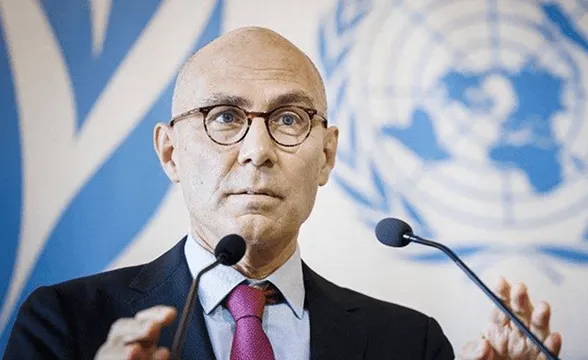UN High Commissioner for Human Rights Volker Türk expressed deep concern on Thursday about the harsh and lengthy sentences recently handed down to 37 people in Tunisia in connection with the so-called “conspiracy case,” considering them a serious setback for justice and the rule of law.
Türk said, “The judicial proceedings were marred by serious violations of fair trial rights and due process guarantees, raising serious concerns about the political motivations behind the trial.”
The defendants, who were tried under the anti-terrorism law and the penal code, included a number of well-known public and political figures in Tunisia. They were charged with vague and broad charges, including forming a terrorist organization, planning to commit terrorist crimes, financing terrorism, and conspiring against the internal and external security of the state. Their sentences ranged from 4 to 66 years in prison.
The High Commissioner noted that eight of the defendants had been held in pretrial detention since February 2023, exceeding the legal maximum of 14 months under the Code of Criminal Procedure, with restrictions on lawyer visits. Court hearings were held in 2025, and detainees were denied direct access to the court, restricted to virtual sessions, based on legislation passed during the COVID-19 pandemic without parliamentary approval.
The trial was conducted amid a lack of transparency. The evidence was not presented to the public, and neither the defendants nor their lawyers were allowed to examine or discuss it publicly. Several journalists, civil society representatives, and diplomats were also barred from attending the hearings.
Defense lawyers emphasized that the charges were based largely on meetings organized by the defendants as part of opposition political activity and meetings with foreign nationals, including diplomats, which do not constitute a crime in any way, and that engaging in public affairs should not be confused with engaging in terrorism.
In another worrying development, lawyer Ahmed Souab, a member of the defense team, was arrested and charged with terrorism-related offenses for statements he allegedly made after the verdicts were issued. This raises further questions about the ability of lawyers to practice their profession freely and safely.
Türk called for ensuring that all defendants enjoy their full legal rights during the appeal process, emphasizing the need to drop charges that are not based on sufficient evidence of wrongdoing.
He also reiterated his call on the Tunisian authorities to end the pattern of politically motivated arrests and prosecutions, immediately and unconditionally release all human rights defenders, lawyers, journalists, activists, and politicians who are being arbitrarily detained, and ensure respect for their fundamental rights, including freedom of opinion and expression.
Türk concluded his statement by saying, “Pretrial detention must remain an exceptional option, while respecting its legal limits. I also call on Tunisia to stop using overly broad national security and counterterrorism legislation to silence dissenting voices and restrict civic space, and to review these laws in line with international human rights standards.”
He added, “Tunisia has been a model and an inspiration to many countries following its political transition in 2011, and I hope it will soon return to the path of democracy, the rule of law, and human rights.”
Mehdi Ben Gharbia and Ahmed Laamari’s case postponed to a later date pending the outcome of the appeal
Tunis, April 24, 2025 – The Criminal Chamber specializing in terrorism cases at the Tunis Court of First Instance decided to postpone the case against former minister and businessman Mehdi Ben Gharbia and Ennahda Movement leader Ahmed Laamari to a later date, pending the outcome of the appeal filed against the referral decision issued by the Indictment Chamber.
The Indictment Chamber of the Tunis Court of Appeal had previously decided to refer Ben Gharbia and Laamari to the Criminal Chamber specializing in terrorism cases, to prosecute them on charges of a terrorist nature, based on facts related to their previous detention in a Tunisian prison.
It is worth noting that the Criminal Chamber had previously decided during a previous session to release Ahmed Laamari and keep him on bail. Mehdi Ben Gharbia continues to face legal proceedings while detained in separate cases.
When terrorism-related cases are attributed to well-known political figures or businessmen, they raise questions about the potential political exploitation of the judiciary, especially in a general climate characterized by an increase in politically motivated prosecutions.
The Freedom for Tunisia Observatory expresses its concern about the continued prosecution of political and civil figures in terrorism cases without sufficient evidence or guarantees of transparency and fairness. It calls for:
Speeding up appeals and judicial referrals without delay.
Ensuring respect for the rights of defendants to a fair trial based on standards of integrity and impartiality.
Avoiding the use of the judiciary as a tool to settle political scores or intimidate the political opposition and businessmen.
The Observatory reiterates the importance of judicial authorities’ commitment to Tunisia’s international human rights obligations, particularly the right to liberty, personal security, and a fair trial.





